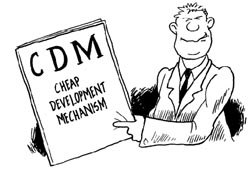Spreading myths of money
 Call it political naivete. But Indian non-governmental organisations ( ngo s) and business organisations have hosted a series of meetings over the last year in metros across the country, where claims have been made that the Clean Development Mechanism ( cdm ) proposed by the Kyoto Protocol under the un Convention on Climate Change ( unfccc ), is good for the country.
Call it political naivete. But Indian non-governmental organisations ( ngo s) and business organisations have hosted a series of meetings over the last year in metros across the country, where claims have been made that the Clean Development Mechanism ( cdm ) proposed by the Kyoto Protocol under the un Convention on Climate Change ( unfccc ), is good for the country.
This is despite a strong and considered position held by the Indian government in the international forum that cdm is unacceptable to the country in its current form, without per capita entitlements. cdm , a mechanism for trading emission credits between industrialised and developing countries, is emerging in the climate negotiations as a patently unfair way of helping industrialised countries like the us spend as little as possible in meeting their commitments to reduce greenhouse gas ( ghg ) emissions.
Through the cdm , countries like India will compete with each other to provide industrialised countries with the cheapest option to make reductions, leaving no least-cost options for themselves when it is their turn to take on emissions reduction targets in the future. Moreover, what they will be trading away under cdm is the right of the present and future generations to the atmosphere (see Down To Earth , Vol 8, No 21, and Green Politics: Global Environmental Negotiations 1, published by the Centre for Science and Environment ( cse ), October 1999).
Along with China, India has led the demand for social justice and equity in the international climate negotiations. In this, the government deserves the support and active encouragement of Indian civil society, particularly since their stand has come under strong opposition from the us , which has refused to ratify the protocol unless countries like India and China agree to cdm . After the us Senate had passed a resolution demanding
